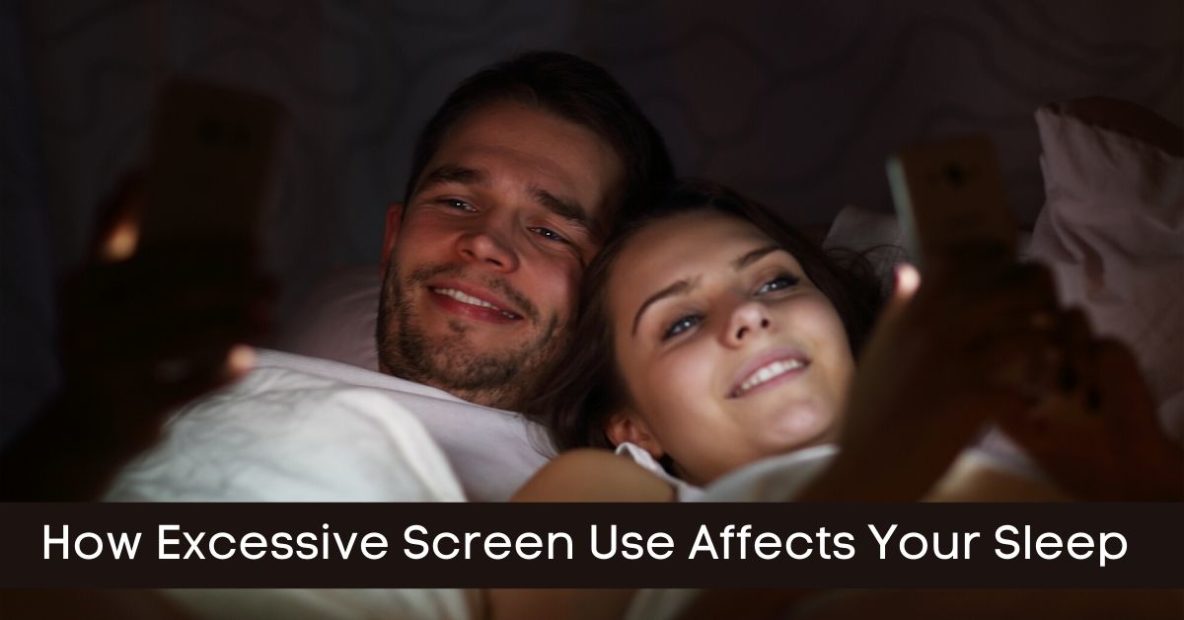How Excessive Screen Use Affects Your Sleep

- A Promising Paradigm Shift: New Research Challenges the CPAP-First Approach to OSA Treatment - September 5, 2023
- Understanding Sleep Meditation Techniques - July 30, 2021
- How Online Learning Has Affected Sleep for Students - July 13, 2021
Screen time is a normal part of life. We use a computer at work, watch TV at home, play a game on our phones, or have a video call with family and friends. All this technology can help us do our best work, learn more, and stay connected with loved ones. But excessive screen use affects your sleep, and if you’ve been having trouble sleeping at night, you may need to spend a bit less time in front of a screen.
How Blue Light Affects Us
Light is an important part of life. Plants use light so grow, and we use light to signal to our bodies that it’s time to get up or go to sleep. In fact, our body’s natural rhythms are governed by light. Your circadian rhythm that regulates your sleep-wake cycle uses light to make sure you’re sleeping at the right time.
Before electricity and screens, people would spend the evening in dim light, such as the candlelight inside the home. This darkness signals to the body that it’s time to wind down for the night and go to sleep. The morning sunlight signals to the body that it’s time to wake up and start the day.
How Screen Time Affects Your Sleep
When you’re exposed to more light at night, such as the light from your screen, your natural circadian rhythm is thrown off. Rather than signaling to your body that it’s time to sleep, and producing melatonin to help you drift off, the light tricks your body into staying awake.
Screens emit blue light that mimics bright sunlight. When you sit in front of a screen in the evening, your body won’t produce melatonin, and you’ll stay awake longer. The light makes your body think it’s still daytime, and your sleep-wake cycle will be completely thrown off.
Sleep is delayed by the artificial blue light from your screen, but you still have to get up for work in the morning. Screen time makes it harder to fall asleep, you won’t get the rest you need, and you’ll be tired during the day.
How to Sleep Better
- Limit screen time: There are a few solutions to falling asleep easier and sleeping better. The best option is to limit your evening screen time. Choose an activity that doesn’t require a screen, such as having an audio only phone call with a friend, or reading a book. We recommend that you put away all your screens two hours before you want to fall asleep.
- Block blue light: You may not be able to banish screens altogether, but you can block the blue light that’s keeping you awake. When you use screens in the evening, whether on your computer or your phone, use a blue light filter that removes the blue light. Your screen will seem yellow or orange, and you’ll be able to look at the screen without exposing yourself to all that blue light. You can also activate a night mode on your devices. This replaces white spaces with dark, so that your screen emits far less light, and makes it easier for you to fall asleep.
- Blue light-blocking glasses: You can also use blue light-blocking glasses in the evening that block the blue light from reaching your eyes. These glasses stop the blue light from affecting you, and your body will produce melatonin in the evening to prepare you for sleep.
- Get more light in the morning: Another way to sleep better at night is to make sure you get a lot of bright light in the morning. This will help your body wake up faster, and be more alert. This helps set your circadian rhythm in the right pattern by encouraging your body to wake up at the right time. You’ll be more likely to feel sleepy in the evening if you consistently get up at the same time every day, and increase your exposure to bright sunlight in the morning.
Sound Sleep Medical
If you’ve been having a hard time falling asleep at night and want to limit your screen time in the evening, we can help. At Sound Sleep Medical we’ll help you find out why you’re not sleeping, and we’ll work together to make sure you can get the sleep you need.
